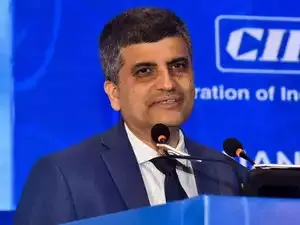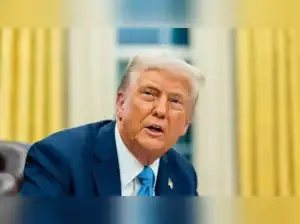New Delhi: Finance secretary Ajay Seth Saturday said global uncertainties may not subside over the medium term and India has to do things differently in a more “purpose-oriented” manner to realise its goal of emerging as a developed nation by 2047. In this "era of uncertainties" and amid a “very tough global environment”, India has to grow at a fast pace for over 20 years while ensuring inclusive development, he added.
Seth was speaking at an event of the Skoch Development Foundation in the capital.
“It’s not just about growth, but it's about inclusive growth. But we have to be clear that without growth, inclusiveness is meaningless. Without growth, distributive policies will have suboptimal results,” he said. “We have to find ways to achieve both (despite external headwinds).”
He said economic imperatives of nations are driving their geopolitical stance and they seem to be moving away from cooperation to more competition.
India has remained the world's fastest-growing major economy since FY22 and is expected to grow 6.5% this fiscal. The latest Economic Survey has projected FY26 economic growth to range between 6.3% and 6.8%.
Earlier this week, the finance ministry flagged risks to the economic growth outlook from geopolitical tensions, trade policy and financial market uncertainties.
The US has proposed reciprocal tariffs on various countries from April 2, with analysts fearing a prolonged global trade tussle. India and the US are, however, engaged in talks for a bilateral trade deal.
Light-touch rules
Going forward, Seth endorsed “light-touch regulatory reforms”, which are people-friendly, modern and flexible and which would improve productivity. He cautioned against control-freak regulatory tendencies and unnecessary guardrails that constrict growth.
The secretary asked: “Do we believe in ‘no accident’ policy, or do we believe in our capacity to deal with accidents in an efficient and a quick manner?”
Four focus areas
“Because if we were to say ‘no accident’ policy, we will keep on growing at a modest rate and it will be a long journey (to a developed India).” But we have to provide for enough entrepreneurship skills in this country,” Seth added.
A high-level committee on regulatory reforms for the non-financial sector, as suggested in the budget, would be set up soon, he said. A mechanism under the Financial Stability and Development Council, headed by the finance minister, would pursue the scope for regulatory reforms in the financial sector as well to support development and allow for more efficient use of capital, he added.
Citing the latest budget announcements, Seth highlighted four focus areas for the government to sustain elevated growth: agriculture; MSME and manufacturing; investments; and exports.
Calling agriculture as the first engine of growth, Seth said even in 2047, half of our population will be in rural areas and a large segment of them will be dependent on farming.
The services sector remains important for the economy but going forward manufacturing prowess has to be ramped up, he said. He said investments would not just be in infrastructure but also in people and their education as well as health. Innovation, too, will receive fresh impetus. The secretary said over the medium term, India may not perform to the best of its ability on the export front, given the external headwinds.
Seth was speaking at an event of the Skoch Development Foundation in the capital.
“It’s not just about growth, but it's about inclusive growth. But we have to be clear that without growth, inclusiveness is meaningless. Without growth, distributive policies will have suboptimal results,” he said. “We have to find ways to achieve both (despite external headwinds).”
He said economic imperatives of nations are driving their geopolitical stance and they seem to be moving away from cooperation to more competition.
India has remained the world's fastest-growing major economy since FY22 and is expected to grow 6.5% this fiscal. The latest Economic Survey has projected FY26 economic growth to range between 6.3% and 6.8%.
Earlier this week, the finance ministry flagged risks to the economic growth outlook from geopolitical tensions, trade policy and financial market uncertainties.
The US has proposed reciprocal tariffs on various countries from April 2, with analysts fearing a prolonged global trade tussle. India and the US are, however, engaged in talks for a bilateral trade deal.
Light-touch rules
Going forward, Seth endorsed “light-touch regulatory reforms”, which are people-friendly, modern and flexible and which would improve productivity. He cautioned against control-freak regulatory tendencies and unnecessary guardrails that constrict growth.
The secretary asked: “Do we believe in ‘no accident’ policy, or do we believe in our capacity to deal with accidents in an efficient and a quick manner?”
Four focus areas
“Because if we were to say ‘no accident’ policy, we will keep on growing at a modest rate and it will be a long journey (to a developed India).” But we have to provide for enough entrepreneurship skills in this country,” Seth added.
A high-level committee on regulatory reforms for the non-financial sector, as suggested in the budget, would be set up soon, he said. A mechanism under the Financial Stability and Development Council, headed by the finance minister, would pursue the scope for regulatory reforms in the financial sector as well to support development and allow for more efficient use of capital, he added.
Citing the latest budget announcements, Seth highlighted four focus areas for the government to sustain elevated growth: agriculture; MSME and manufacturing; investments; and exports.
Calling agriculture as the first engine of growth, Seth said even in 2047, half of our population will be in rural areas and a large segment of them will be dependent on farming.
The services sector remains important for the economy but going forward manufacturing prowess has to be ramped up, he said. He said investments would not just be in infrastructure but also in people and their education as well as health. Innovation, too, will receive fresh impetus. The secretary said over the medium term, India may not perform to the best of its ability on the export front, given the external headwinds.








